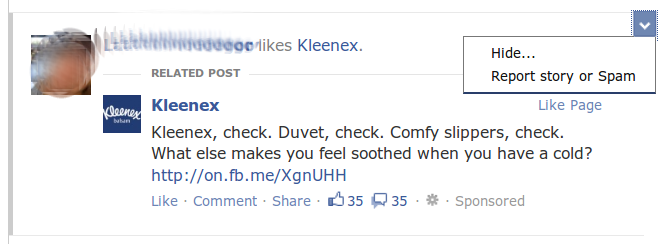Revenge of the Spammed
I've moaned before about the crap adverts on social networks. Facebook has suddenly been getting a lot worse. Today they decided that it would be great to show me adverts for a steak restaurant. Which, would be fine, if I hadn't been vegetarian for the last 13 years...
Facebook have been spamming my wall with all sorts of rubbish - dodgy share trading deals, timeshare scams, PPI reclaim cons, malicious Android apps - really bottom of the barrel stuff.
So, as I'm too weak-willed to abandon Facebook, I've started retaliating. At a basic level, I block the stories as spam.
 That, hopefully, blocks them from appearing again. I file abuse reports which, hopefully, take up a little bit of Facebook's time.
That, hopefully, blocks them from appearing again. I file abuse reports which, hopefully, take up a little bit of Facebook's time.
Mainly, though, I complain to the company - especially if it's a UK one. I write on their wall saying that I don't appreciate them spamming me. I leave "interesting" links on their posts letting others know what think of them. For example, when overpriced smoothie maker "Innocent" started spamming me, I reminded their followers that - far from being innocent - they had taken substantial investment from Coca-Cola. A company with business practices which don't exactly fit Innocent's image.
When BP spammed my wall, I contributed to theirs with videos about people protesting BP's greenwashing of the arts. I also shared the videos and articles with my friends.
I'm not alone in this, it seems. People love telling companies that they don't like their product or their spamming attitude.
This is what happened to Innocent when they started promoting their posts to people who didn't want to see them.
 (I've edited out some of the positive comments - but Innocent deleted my disparaging comments and blocked me from their page - so I think that's fair.)
(I've edited out some of the positive comments - but Innocent deleted my disparaging comments and blocked me from their page - so I think that's fair.)
It's often said that customers prefer telling each other bad news about a company rather than good. What happens when every supposedly positive "sponsored story" gets users telling their friends just how much they despise a spamming brand?
The meme-du-jour is "If you're not paying, that means you're not the customer; you're the product." We are the product being sold and some of us don't like it.
That's the premise of my wife's most recent blog post.
It asks a rather simple and quite unnerving question. What happens when the "product" starts rebelling?
Facebook might not like this attitude, but they made the decision to design a business which sells rational, self interested agents in the first place. If they didn’t want their ‘product’ to rebel against them they shouldn’t have gone into the business of selling something which has a brain. Liz Eden
I've been told that Facebook won't offer people a way to pay to opt out of advertising. The people who can afford to pay are the ones which advertisers are desperate to target. Will there, I wonder, come a time when the negative publicity generated by resentful products offsets the gains from selling us?
 Dealing with SMS Spam from @PaddyPower
Dealing with SMS Spam from @PaddyPower
Also I am not a fan of the you are the product one liner. Just because you are not the customer does not make you the product. You are a user of one product and if a company does not treat you well as customer who is as loyal as the average shopper (is not very) then you will eventually leave and they will not have a user to deliver the advertising service (or the actual moneymaking product) to.